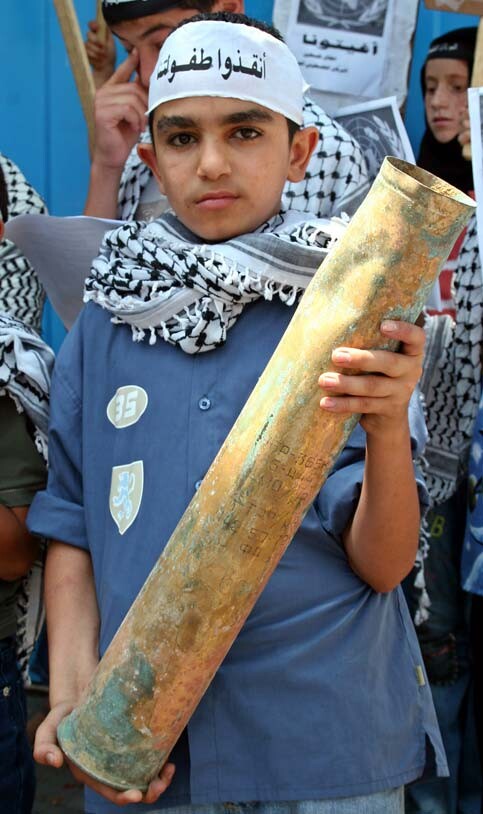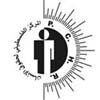Palestinian Center for Human Rights 23 June 2006

Palestinian children hold remains of Israeli missiles during a demonstration to protest Israeli air strikes and call for international protection, outside the United Nations headquarters in Gaza City June 22, 2006. (MaanImages/Mohamed al-Zanon)
The second and final day of PCHR’s conference entitled “The New Palestinian Government and the Human Rights Agenda” ended on the afternoon of Thursday, 22 June 2006, in Gaza City. Former Health Minister, Dr. Riyad Zanoun, headed the second session of the day and the last session of the conference. The session discussed economic, social, and cultural rights, and included four presentations.
Dr. Majdi Ashour, a researcher in health policy and management, presented a paper on “Right to Health: deterioration of health conditions as a result of the boycott and suspension of funding.” The speaker stated that the suspension of the transfer of Palestinian tax revenues to the Palestinian treasury, the stoppage of international funding of Palestinian governmental institutions, and forcing Palestinian commercial banks not to deal with the Palestinian National Authority (PNA) will have an effect on the performance of the health sector and on health conditions in the Occupied Palestinian Territory (OPT).
Ashour pointed out that the most concerning indicators include the deterioration in infant mortality, despite the sustained and continuous historic improvement in this area over the past decades. He stated that this deterioration started in the year 2000. In addition, he pointed to the increase in psychological problems, especially those pertaining to post-traumatic stress, and to the increase in health problems caused by malnutrition, especially among children and child-bearing women. In addition, Ashour pointed to the increase in casualties by Israeli violence.
Mr. Ahmad Dahbour, the under-secretary of the Ministry of Culture, spoke about stimulating cultural life in Palestine. He stated that institutional cultural activity was absent from the Palestine context despite the great contributions of cultural figures to the Palestinian cause prior to the establishment of the PLO. He stated that the term culture was only integrated into the PLO in May 1974. In addition, he pointed out that the Oslo Accords did not include the word culture in its texts. He stated Palestinian cultural achievements were mostly individual and not institutional.
Dahbour summed up his recommendations to the government and to Palestinian society as a whole in one point: the necessity of establishing the foundations and motivation for Palestinian cultural activity relying on civil society institutions, since the official Palestinian establishment is unable to bear this responsibility.
Dr. Amer El-Khatib, professor of Philosophy at Al-Azhar University, presented a paper on “Right to Education: effect of the boycott on the educational sector.” He stated that stopping international aid to the Palestinian people will have grave effects in the short and medium terms, particularly on the educational sector. He stressed the importance of maintaining the Palestinian educational system, the main tool of influencing and shaping society.
El-Khatib pointed to the effects of the economic boycott on Palestinian students, on educational spending, the high percentage of salaries in educational spending, lack of investment in education, the importance of elementary education compared to secondary education, and the percentage of educational spending in the general budget.
Dr. Basem Na’im, Minister of Health, gave a presentation about the overall health situation and its main indicators in the period before the formation of the new government and afterwards. In addition, he talked about the work that the government has done and is intent on carrying out. He pointed to the fact that many hospitals and clinics have been built since the establishment of the PNA, indicating that the Ministry of Health has become the major healthcare provider in the OPT.
Na’im stated that since taking office, the Ministry of Health has been working in various fields on the internal and external fronts. On the internal level, he pointed to cut backs on spending, especially in external referrals, without affecting the quality of service provided to the public. He stressed the importance of efforts to strengthen the relationship of the Ministry with the public. He also stressed the fact that the international community is obliged to support the Palestinian people, since it provides the occupying power with the cover and silent consent it needs to continue the occupation and perpetrate its crimes.
The floor was opened for questions and discussion before the closing speech by Mr. Raji Sourani.
In the closing speech, Sourani reaffirmed the motive and justification for holding the conference. He pointed to the fact that Palestinian human rights organizations and civil society institutions did not have an easy relationship with previous Palestinian governments or with Israel, due to their work in exposing human rights violations on both fronts.
He added that there is a newly elected government that is different from previous governments and with this comes concerns and recommendations from civil society that must be discussed with this new government. He stressed that dialogue and collective work, despite differing opinions, is the only way Palestinian society can develop, since Palestine cannot be monopolized by any single party.
Sourani commended the government’s interaction with the conference. He pointed out that the Prime Minister and six Ministers or their deputies attended the conference, indicating that this wide participation is indicative of the importance the government gave to the conference.
Sourani also commended international human rights organizations and solidarity groups, some of which were represented at the conference. He commended their solidarity with Palestinians over the years. He also stressed that the Palestinian issue is one of human rights, since the first and third articles of the International Declaration of Human Rights established the rights of self determination and resistance against the occupation. He stated that Palestinians will not forgive the enemy that kills children and that the perpetrators of these crimes will be brought to justice. Sourani also stressed the importance of maintaining a higher moral ground than the occupation, and to avoid committing crimes similar to what the occupation commits.
Dr. Riyad Zanoun ended the conference by commending PCHR for holding the conference in an effort to strengthen the ties between the people and their government. He stressed that Palestinians have one homeland and are one society; thus they have no choice but to establish harmony and compassion among each other and to respect differing opinions.
